China Beaches
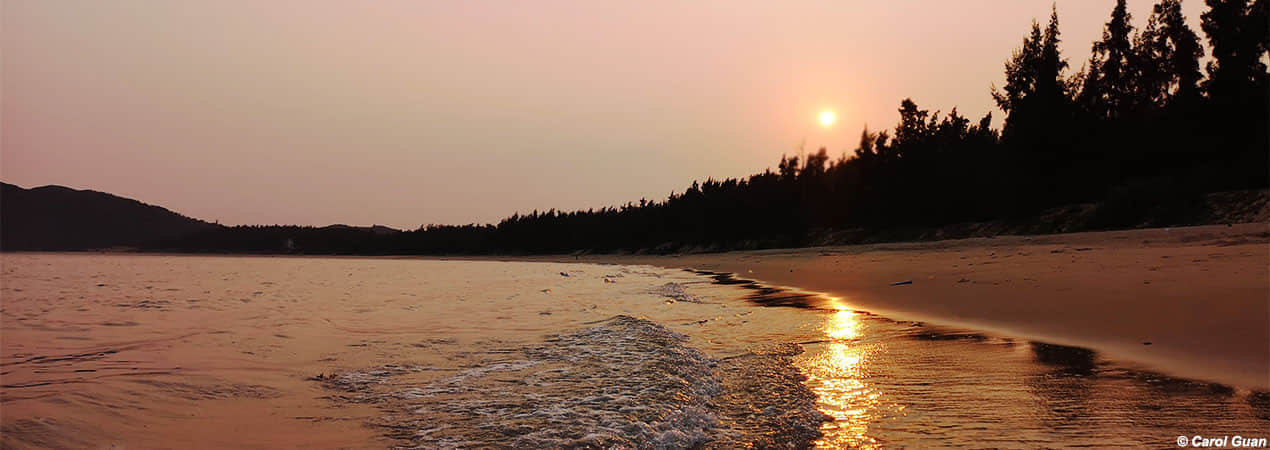
Since most people travel to China during the warmer months, an escape to the beach can be a wonderful addition to any vacation. Taking a few days off to go for a swim, soak up some sun, and catch up on sleep is what most of us dream of when heading to the beach. If considering a beach visit while in China, here’s some tips and information that will help make your trip more enjoyable.
The Best Beaches – (mostly, it’s Hainan)
When researching “China’s best beaches”, invariably the list will contain the uber-famous island of Hainan and its darling city of Sanya. Often described as the “Hawaii of China”, Hainan is truly where the cleanest, least crowded, and most pristine beaches are located. Although China has an enviably long coastline, water north of Shanghai will be usually too cool to enjoy and south of Shanghai visitors will often contend with large crowds. However, with good research, there are some nice beaches that are well kept and (during the weekdays at least) not too overly crowded.
Here is a small list of some recommend beaches. If nothing here grabs your fancy, and you have a hankering for exploration and adventure, then secure some reliable transportation and scour a map looking for your very own, hidden beach getaway.
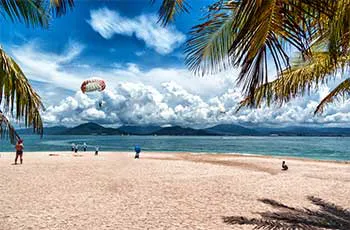 The Beaches of Hainan
The Beaches of Hainan
- Yalong Bay (亚龙湾) – Hainan, China
- Shimei Bay (石梅湾) – Hainan, China
- Sun and Moon Bay (日月湾) – Hainan, China
- Tianya Haijiao (天涯海角) – Hainan, China
- Silver Beach (银色海滩) – Guangxi, China
- Weizhou Island (涠洲岛) – Guangxi, China
- Beidaihe (北戴河) – Hebei, China (near Beijing)
- White Pebble Beach (金石滩) – Dalian, China
- Songlanshan (松兰山) – Ningbo, China
- Putuoshan island (普陀山) – Outside of Shanghai
Water Temps
Beaches can be divided into three geographic categories – Southern (from Fuzhou to the south), Middle (from Shanghai to Fuzhou), Northern (north of Shanghai).
Average Water temperature for May-September
Southern: 80-90oF / 27-33oC
Middle: 70-80oF / 20-26oC
Northern: 60-70oF / 15-20oC
Big Crowds
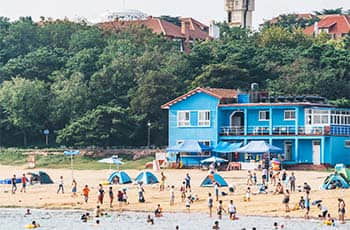 The clowded beach in China
The clowded beach in China
One of the biggest challenges when looking for a relaxing beach escape in China is finding one without the wall-to-wall people that Chinese beaches are infamous for. In general, this is mostly a futile exercise so before going, it’s best to prepare oneself for sharing the sand with a lot of other people. A significant percent of China’s 1.4 billion people lives within a couple of hours of the coast, so the strains of supply and demand are on full display.
Most of the well-developed, heavily visited beaches have turnstiles installed at the entrance and an electronic billboard nearby displaying the number of people. During weekends and holidays, beaches near major cities (the most conveniently located beaches) can have 20,000 – 40,000 people. So, to escape these high numbers, it’s necessary to go during the week, travel as far from a metropolitan area as possible, and avoid holidays at all cost.
TIPS: For the best beach vacation in China
1) Go during the week
2) Travel as far from a metropolitan area as possible
3) Avoid holidays at all cost
4) Go to “paid entrance fee” beaches
Cultural Differences
There are a couple of cultural aspects to Chinese beaches that are polar opposite from Western beaches, so here’s a quick run-down:
Night verses Day
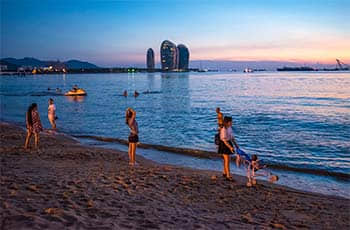 People on the beach in the evening
People on the beach in the evening
For unique cultural reasons, most Chinese people do not enjoy getting a tan. Most also do not like applying sunscreen (considered by many to be a harmful chemical). So, how can someone enjoy the beach if that person doesn’t want to be exposed to the sun? Go at night!
For those looking for smaller crowds, its best to go during days when there’s plenty of sun. Chinese beaches can be somewhat sparse during the heat of the day when the sun is really strong, but as soon as it starts getting late, and the sun starts to get low, throngs of people will suddenly pour onto the beach.
Another way Chinese avoid sun exposure is by covering up. In fact, the ominous looking “facekini” was invented in China. So don’t be surprised to see people using any number of clothing options to cover themselves up.
Did you know? Why do so many Chinese dislike getting a tan? Traditionally, tanned skin represented doing manual labor outside which also indicated someone was of a lower socio-economic class. Conversely, lighter skinned meant someone stayed inside all day, which usually indicated being from a higher socio-economic class. Even today, these assumptions are still pervasive throughout Chinese society and beauty standards lean heavily toward a preference for lighter skin. People with lighter skin get preferential treatment in love, friendship, careers, and education while those with darker skin are still often discriminated against.
Swimsuits – Tight verses Loose
In the West, the general, unwritten rule is that men wear loose fitting, baggy swimsuits and women wear tight, fairly revealing swimwear (the European male speedo notwithstanding). However, in China, it’s the opposite. Men almost exclusively wear tight fitting speedos and spandex swim briefs while ladies wear one-piece suits with a skirt. Bikinis are slowly becoming more common, but they are mostly considered peculiar and draw a disproportionate amount of interest.
Stares and Pictures
Revealing two-piece swimsuits worn by Westerns are still so rare on Chinese beaches (outside of Sanya), that bikini-clad visitors should expect a fair number of stares and cellphones directed in their direction. Sun-bathing is also fairly uncommon, so if you’re lying out, sporting your favorite two-piece, don’t be surprised to get a lot of bewildered looks.
To avoid this type of situation, it pays to travel to beaches located a little further away from metropolitan areas, walk to the furthest ends of the beach once there, and as previously mentioned, going during sunny days, during the week, and avoid weekends and holidays.
Banana Boat, Paragliding, Fun Activities
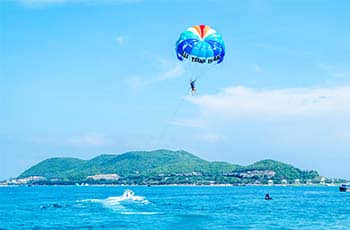 Interesting Paragliding over thesea
Interesting Paragliding over thesea
As is popular in the West, many beaches in China will have all the safety features and tourist activities found elsewhere in the world.
1) Lifeguards
2) Roving police
3) The Banana Boat
4) Boat trips
5) Paragliding
If this is not your scene, and you prefer quiet, pristine, desolation then it pays to research well before choosing your beach destination and possibly renting a car (or getting a taxi/driver) to reach those beaches that don’t have the above attractions.
Travelers may wish to know that some beaches located right outside large metropolitan areas will often blast community service messages (in Mandarin of course) from loudspeakers continuously throughout the day.
Paid Admission? (It’s better than you think)
Some Chinese beaches are completely closed off limiting access to one or two specified areas. Sometimes, this is done for crowd control and other times it’s because the beach charges an entrance fee. While paying an entrance fee to go to the beach can be off-putting for some travelers, it can be one’s best friend in China. A paid entrance means a significant reduction in the number of people, plus a more sophisticated group of beachgoers. The fee can vary but is usually only around $5 - $10 USD. This is a pretty good deal for the extra peace-and-quiet.
Look, but Don’t Touch
The more touristed, heavily visited beaches can sometimes have restrictions, so it’s best to check for these before deciding on your beach destination. The following is a list of the more common restrictions:
1) Swimming only allowed in the “shallow” area. Rope buoys will designate the limits and lifeguards on jet skies will politely approach anyone who swims beyond them.
2) Swimming (nearly) prohibited – Wanting to sign up for a guided day-trip excursion to that gorgeous island you saw in a brochure or heard some people recommend? You might want to inquire before paying up. Sometimes, beaches, especially small islands, will prohibit all swimming outside of small, designated areas. Snorkeling can also be prohibited.
3) No nudity or female toplessness
Note: The above restrictions are rarely ever found at remote, out-of-the-way beaches.
Showers, Restroom Facilities, Foot Washing Stations
Well-developed beaches close to metropolitan areas will have all the creature comforts found in the West – bathrooms and changing areas, showers, foot wash stations, stalls selling food and water (and even coconuts). Less developed, or remote, beaches will not have most of these services.
Not every beach will rent chairs or umbrellas, so if this is important to you, check ahead of time.
Sunscreen
It is possible to buy sunscreen in China, but it’s not as common as in the West. It’s mostly sold in pharmacies (OTC) and they should offer some western brands – mostly Nivea and Neutrogena. But, expect to pay significantly more for significantly less. US and Canadian travelers may be in for the worst shock. Forget about paying $5 USD for those huge 24oz bottles at Walmart. You’ll be lucky to find 3 oz for $5 USD, meaning that 24oz bottle back home will run over $40 USD in China. The SPF should however be satisfactory with most brands offering from 30-100 SPF.
Overall, it’s much wiser to bring your sunscreen from home and if you run out, spill it, or lose it, then buy some locally.
TIP - Geography Note: Because Hainan is located far enough south that it’s below the Tropic of Cancer, the sun will be much stronger there than back home. Therefore, it’s recommended to use 50 SPF at minimum for most skin types, or 100 SPF for fair skin. If you don’t, you risk a nasty burn.
Oceanfront “Greenways” and Boardwalks
Around major cities, metro governments have done an impressive job of building wonderful oceanfront boardwalks and other nature trails (for walking, running, or even cycling). If you fancy going for a sunset stroll, or just would like get a little peaceful exercise while the ocean breeze blows through your hair, check ahead of time for which cities/areas have these oceanside “greenways” (usually built on the rocky areas to the side of the sandy beach area).
 Fresh Seafood for sale in the restaurant
Fresh Seafood for sale in the restaurant
Fresh Seafood – (Hint: You can get it anywhere)
A unique feature of Chinese, and Asian, society regarding seafood is that most decent restaurants keep live fish tanks on premise stocked full of live fish and shellfish. This means it’s fairly easy to get fresh seafood all over the country and unnecessary to travel to the coast for that fresh-from-the-ocean taste.
However, if variety is what you’re looking for, then beach areas will usually have a far better selection of fish and seafood.
Dangers and Nuisances
Nature – Riptides and strong under currents are not normal at most beaches in China, especially the well-developed ones, however it’s always a good idea to check local conditions if this is a concern. The Chinese coast can get an occasional storm, such as a hurricane (called a typhoon in Asia), but these are rare and accurate predictions of landfall are given many days in advance.
Marine Animals – Jellyfish can sometimes be a nuisance on some beaches. The number of jellyfish changes with the tide, current, and climate but is rarely overwhelming enough to pose a danger. Most travelers can swim as much as they like and never encounter a single one; however, if this is a concern, show a picture of a jellyfish to any lifeguard, police, or younger beachgoer and if they are present that day, someone will say so.
Sharks attacks are extremely rare. Hundreds of millions of people enjoy the beach every year in China without any statistically significant danger from them.
Sea urchins are quite common around rocky areas so wearing aqua socks/shoes is recommended there.
People– While it’s never a good idea to leave valuables unattended on any beach while you cool off (better to leave most cash, credit cards, IDs, etc. locked in your bags in your hotel), there are very few reports of theft on most Chinese beaches. The busiest ones have a watchful police presence, and the less-busy ones simply don’t have many reports of this. So, normal prudence should be observed when leaving your personal items unattended, but travelers can rest assure that their stuff is reasonably safe.
Many travelers report uncomfortable stares in their direction, but this is nearly always harmless curiosity and a more cultural acceptance of gazing.

 Top World Heritage Sites in China
Top World Heritage Sites in China  Top 10 Landmarks in China
Top 10 Landmarks in China  Great Wall of China
Great Wall of China 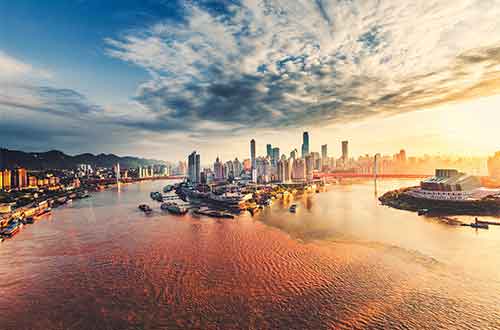 The Yangtze River
The Yangtze River